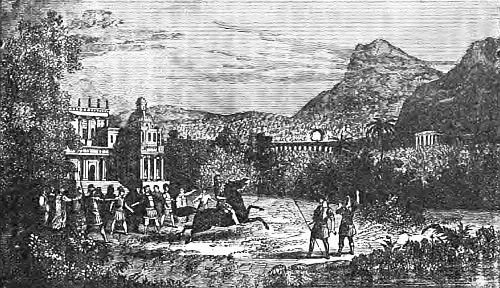He perceived that a part of the difficulty was caused by the agitations which the horse experienced in so strange and new a scene, and that he appeared, also, to be somewhat frightened by his own shadow, which happened at that time to be thrown very strongly and distinctly upon the ground. He saw other indications, also, that the high excitement which the horse felt was not viciousness, but the excess of noble and generous impulses. It was courage, ardor, and the consciousness of great nervous and muscular power.
Philip condemns the horse.
Alexander desires to mount him.
Philip had decided that the horse was useless, and had given orders to have him sent back to Thessaly, whence he came. Alexander was very much concerned at the prospect of losing so fine an animal. He begged his father to allow him to make the experiment of mounting him. Philip at first refused, thinking it very presumptuous for such a youth to attempt to subdue an animal so vicious that all his experienced horsemen and grooms condemned him; however, he at length consented. Alexander went up to the horse and took hold of his bridle. He patted him upon the neck, and soothed him with his voice, showing, at the same time, by his easy and unconcerned manner, that he was not in the least afraid of him. A spirited horse knows immediately when any one approaches him in a timid or cautious manner. He appears to look with contempt on such a master, and to determine not to submit to him. On the contrary, horses seem to love to yield obedience to man, when the individual who exacts the obedience possesses those qualities of coolness and courage which their instincts enable them to appreciate.
 Alexander and Bucephalus.
Alexander and Bucephalus.
Bucephalus calmed.
An exciting ride.
At any rate, Bucephalus was calmed and subdued by the presence of Alexander. He allowed himself to be caressed. Alexander turned his head in such a direction as to prevent his seeing his shadow. He quietly and gently laid off a sort of cloak which he wore, and sprang upon the horse's back. Then, instead of attempting to restrain him, and worrying and checking him by useless efforts to hold him in, he gave him the rein freely, and animated and encouraged him with his voice, so that the horse flew across the plains at the top of his speed, the king and the courtiers looking on, at first with fear and trembling, but soon afterward with feelings of the greatest admiration and pleasure. After the horse had satisfied himself with his run it was easy to rein him in, and Alexander returned with him in safety to the king. The courtiers overwhelmed him with their praises and congratulations. Philip commended him very highly: he told him that he deserved a larger kingdom than Macedon to govern.
Sagacity of Bucephalus.
Becomes Alexander's favorite.
Alexander's judgment of the true character of the horse proved to be correct. He became very tractable and docile, yielding a ready submission to his master in every thing. He would kneel upon his fore legs at Alexander's command, in order that he might mount more easily. Alexander retained him for a long time, and made him his favorite war horse. A great many stories are related by the historians of those days of his sagacity and his feats of war. Whenever he was equipped for the field with his military trappings, he seemed to be highly elated with pride and pleasure, and at such times he would not allow any one but Alexander to mount him.
Fate of Bucephalus.
What became of him at last is not certainly known. There are two accounts of his end. One is, that on a certain occasion Alexander got carried too far into the midst of his enemies, on a battle field and that, after fighting desperately for some time, Bucephalus made the most extreme exertions to carry him away. He was severely wounded again and again, and though his strength was nearly gone, he would not stop, but pressed forward till he had carried his master away to a place of safety, and that then he dropped down exhausted, and died. It may be, however, that he did not actually die at this time, but slowly recovered; for some historians relate that he lived to be thirty years old—which is quite an old age for a horse—and that he then died. Alexander caused him to be buried with great ceremony, and built a small city upon the spot in honor of his memory. The name of this city was Bucephalia.
Alexander made regent.
Alexander's character matured rapidly, and he began very early to act the part of a man. When he was only sixteen years of age, his father, Philip, made him regent of Macedon while he was absent on a great military campaign among the other states of Greece.
1 comment